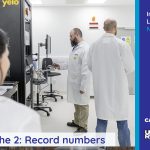Researcher in Residence: Introducing the Physical-Digital Affordance Index (PDAI)

A transformative research project is poised to address a critical aspect of modern engineering—digitisation. The Physical-Digital Affordance Index (PDAI) will be developed by the University of Bristol’s Dr Mark Goudswaard in collaboration with Digital Catapult, establishing a framework for optimising the use of design tools in engineering practices.
Digitisation has become integral to engineering, influencing design processes, stakeholder interaction, and system management. The project recognises the impact of design processes representations, be they physical or digital, on design outcomes and the cognitive processes of engineers. However, despite this recognition, a lack of industrially relevant methodologies has left questions about the most effective application of design representations unanswered.
The PDAI aims to fill this gap by facilitating the selection of appropriate design tools based on specific requirements. The project will unfold in three phases, starting with the replication of academic studies in industrial settings, followed by new industry-focused studies shaped in collaboration with Digital Catapult partners and projects. The final phase involves testing the validity and applicability of the PDAI in real-world projects.
Collaboration with the Digital Catapult, a technology innovation centre, strengthens the project’s industry relevance. The goal is to establish a bridge between academia and industry, enhancing the application of design tools in real-world scenarios.
Dr Goudswaard’s project holds the promise of improving engineering digitisation practices, bringing greater efficiency and resilience to design processes. The project underscores the significance of aligning academic research with practical industry needs, fostering a symbiotic relationship that drives innovation and advancement.
Speaking about the project, Mark said: “In many areas, including engineering design, we see increased use of digital tools and technologies but often their application can be from a ‘tech push’ angle without much consideration of whether it’s a good thing or not. In this project we’re more concerned with a holistic view on the impact that tool selection has on design processes and their outputs such that combinations of physical and digital design tools can be applied in the best possible way to facilitate optimal design outcomes.
“It’s exciting to be able to work with the Digital Catapult in this project as their wide experience in the digital space along with a broad portfolio of projects enables the creation of a physical-digital affordance index that can be industrially applied and used to improve design practice.”
Dr Mark Goudswaard was part of Tranche 1 of our Researchers in Residence scheme.



